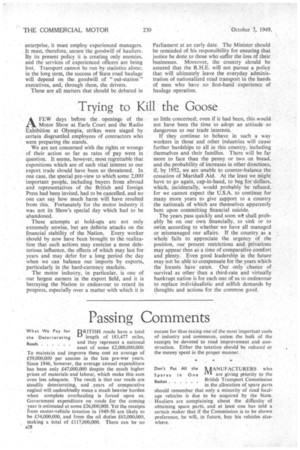Trying to Kill the Goose
Page 30

If you've noticed an error in this article please click here to report it so we can fix it.
AFEW days before the openings of the Motor Show at Earls Court and the Radio Exhibition at Olympia, strikes were staged by certain disgruntled employees of contractors who were preparing the stands.
We are not concerned with the rights or wrongs of their action so far as rates of pay were in question. It seems, however, most regrettable that expositions which are of such vital interest to our export trade should have been so threatened. In one case, the special pre-view to which some 2,000 important people, including buyers from abroad and representatives of the British and foreign Press had been invited, had to be cancelled, and no one can say how much harm will have resulted from this. Fortunately for the motor industry it was not its Show's special day which had to be • abandoned.
These attempts at hold-ups are not only extremely unwise, but are definite attacks on the financial stability of the Nation. Every worker • should by now have been brought to the realization that such actions may exercise a most deleterious influence, the effects of which may last for years and may defer for a long period the day when we can balance our imports by exports, particularly in the hard-currency markets. The motor industry, in particular, is one of our largest earners in the export field, and it is betraying the Nation to endeavour to retard its progress, especially over a matter with which it is so little concerned; even if it had been, this would not have been the time to adopt an attitude so dangerous to our trade interests.
If they continue to behave in such a way workers in those and other industries will cause further hardships to all in this country, including themselves and their families. There will be far more to face than the penny or two on bread. and the probability of increases in other directions, if, by 1952, we are unable to counter-balance the casation of Marshall Aid. At the least we might have to go again, cap-in-hand, to beg for -dollars, which, incidentally, would probably be refused, for we cannot expect the U.S.A. to continue for many more years to give support to a country the nationals of which are themselves apparently bent upon committing financial suicide.
The years pass quickly and soon we shall probably be on our own financially, to sink or to swim according to whether we have all managed or mismanaged our affairs. If the country as a whole fails to appreciate the urgency of the position, our present restrictions and privations may appear then as a time of comparative comfort and plenty. Even good leadership in the future may not be able to compensate for the years which the locusts have eaten. Our only, chance of survival as other than a third-rate and virtually bankrupt nation is for each one of us to endeavour to replace individualistic and selfish demands by thoughts and actions for the common good.




































































































